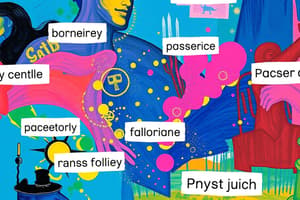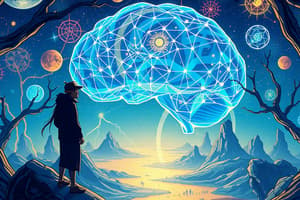Podcast
Questions and Answers
What is psychology?
What is psychology?
- The study of animals
- A form of philosophy
- The scientific study of behavior and mental processes (correct)
- The study of human emotions
What characterizes scientific methods in psychology?
What characterizes scientific methods in psychology?
Systematic observation and drawing conclusions.
What is behavior?
What is behavior?
Everything we do that can be directly observed.
What are mental processes?
What are mental processes?
What is critical thinking?
What is critical thinking?
What is the empirical method?
What is the empirical method?
What is positive psychology?
What is positive psychology?
What are the core attitudes of the scientific approach?
What are the core attitudes of the scientific approach?
What did Freud believe about human behavior?
What did Freud believe about human behavior?
Who is Wilhelm Wundt?
Who is Wilhelm Wundt?
What was significant about Wundt's telegraph experiment?
What was significant about Wundt's telegraph experiment?
What is structuralism?
What is structuralism?
How does functionalism differ from structuralism?
How does functionalism differ from structuralism?
James described the mind as a _____ of consciousness.
James described the mind as a _____ of consciousness.
What is natural selection?
What is natural selection?
What does it mean if a characteristic of an organism is adaptive?
What does it mean if a characteristic of an organism is adaptive?
How is Darwin's work relevant to psychology?
How is Darwin's work relevant to psychology?
What does the biological approach focus on?
What does the biological approach focus on?
What is neuroscience?
What is neuroscience?
What does the behavioral approach emphasize?
What does the behavioral approach emphasize?
What did B.F. Skinner emphasize about psychology?
What did B.F. Skinner emphasize about psychology?
What is the psychodynamic approach?
What is the psychodynamic approach?
What does the humanistic approach focus on?
What does the humanistic approach focus on?
What does the cognitive approach focus on?
What does the cognitive approach focus on?
What is the evolutionary approach?
What is the evolutionary approach?
What are the key differences between cognitive and psychodynamic approaches?
What are the key differences between cognitive and psychodynamic approaches?
How do biological and evolutionary perspectives on psychology compare?
How do biological and evolutionary perspectives on psychology compare?
What ideas does Skinner's behaviorist approach emphasize?
What ideas does Skinner's behaviorist approach emphasize?
What careers might someone with a graduate degree in psychology pursue?
What careers might someone with a graduate degree in psychology pursue?
What are important distinctions between a clinical psychologist and a psychiatrist?
What are important distinctions between a clinical psychologist and a psychiatrist?
Name five areas of specialization in psychology.
Name five areas of specialization in psychology.
What has psychology recognized about the relationship between the mind and the body?
What has psychology recognized about the relationship between the mind and the body?
What mental processes might be involved in changing your physical body?
What mental processes might be involved in changing your physical body?
What are some examples of the body's impact on the mind?
What are some examples of the body's impact on the mind?
Flashcards are hidden until you start studying
Study Notes
Key Concepts in Psychology
- Psychology is the scientific study of behavior and mental processes.
- Science involves systematic methods to observe and draw conclusions about natural phenomena, including behavior.
Behavior and Mental Processes
- Behavior encompasses all directly observable actions.
- Mental processes include thoughts, feelings, and motives that are not visible.
Critical Thinking in Psychology
- Critical thinking involves deep reflection, questioning, and evaluating evidence.
- Empirical methods focus on gaining knowledge through observation, data collection, and logical reasoning.
Branches of Psychology
- Positive psychology emphasizes human strengths and well-being.
Goals of Psychological Science
- Psychological research aims to describe, predict, and explain behavior, as well as control or change it.
Attitudes Core to Scientific Approach
- Four core attitudes: Critical thinking, skepticism, objectivity, curiosity.
Freudian Influence
- Freud proposed that human behavior is largely driven by unconscious impulses.
- He viewed human nature as inherently flawed, based on his clinical experiences.
Wilhelm Wundt
- Wundt, known as the founder of modern psychology, integrated philosophy with natural sciences.
- His 1879 experiment at the University of Leipzig measured reaction time, marking the birth of psychology.
Introspection and Structuralism
- Introspection involves self-examination of thoughts and feelings.
- Structuralism focuses on identifying the basic structures of the mind through introspection.
William James and Functionalism
- James introduced functionalism, emphasizing the purpose of mental processes rather than their structures.
- He viewed the mind as fluid and evolving, coining the term "stream of consciousness."
Evolutionary Basis in Psychology
- Natural selection describes how adaptive traits enhance survival and reproduction.
- Evolutionary approaches in psychology explain behaviors through adaptation and selective pressures.
Approaches to Psychology
- The biological approach examines the brain's role in behavior.
- Neuroscience studies the nervous system's structure and function.
- The behavioral approach prioritizes observable behaviors over internal thoughts.
- B.F. Skinner emphasized behavior shaped by rewards and punishments.
- The psychodynamic approach explores unconscious conflicts and early experiences.
- Humanistic psychology focuses on positive growth and personal freedom.
- Cognitive psychology looks at mental processes like perception and memory.
- The sociocultural approach studies how social and cultural environments shape behavior.
Distinctions and Specializations
- Differences between cognitive and psychodynamic approaches: Cognitive focuses on mental processes; psychodynamic emphasizes unconscious influences.
- Clinical psychologists (Ph.D.) vs. psychiatrists (M.D.); only psychiatrists can prescribe medication.
Areas of Specialization in Psychology
- Physiological psychology: Investigates biological processes related to mental functions.
- Sensation and perception: Studies systems and processes that allow sensory experiences.
- Learning: Examines behavior changes due to environmental interactions.
- Cognitive psychology: Analyzes attention, memory, and information processing.
- Developmental psychology: Explores human growth from conception to death.
Mind-Body Connection
- The mind and body exhibit intricate relationships; changes in mental processes affect physical outcomes.
- Mental processes essential for physical changes include commitment, goal-setting, and self-discipline.
Examples of Body-Mind Impact
- Diet impacts brain function through the brain-gut connection.
- Daily routines affect behavior due to circadian rhythms.
- Reward systems involving dopamine influence behavior patterns.
Studying That Suits You
Use AI to generate personalized quizzes and flashcards to suit your learning preferences.




